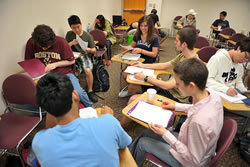
Twenty-eight undergraduate mathematics students from different universities, including nine students from Notre Dame, gathered on campus May 21-26 to study knot theory, hearing lectures and working in open-ended problem sessions that can continue when the event ends. The session was part of the Center for Mathematics’ Thematic Program on Topology and Field Theories program that includes a week for graduate and postdoctoral students and another for a conference.
“There’s lots of interesting mathematics that students learn about in graduate school that they don’t learn about as undergraduates,” said Sam Evens, an associate professor of mathematics who organized the event with Stephan Stolz. “We’re trying to tell them about interesting stuff. They listen to some lectures. They have problem sessions. The hope is they leave with a new interest, and they’re more inclined to take courses in that particular subject in the future, to open new vistas to them.”
For Notre Dame junior Matthew Cole, an honors math major, it was an opportunity to encounter new ideas and prepare for a mathematics future. For Notre Dame senior Murphy Kate Montee, it was another look at a field that was the subject of her REUs last summer and this summer as well as her major.For Boston College senior Amy Nesky, it was an opportunity to keep in practice before her summer REU at Brown University starts in mid-June.
For all the students, it was an opportunity to engage with peers who share their passion for mathematics, and who likely will cross paths later in the compact world of higher mathematics. Problem sessions extended well into lunchtime and topic occupied many dinner conversations. Lectures were accessible to those with less practice in the subject but open to deeper questions by the more experienced. “This program gives an opportunity to look at the abstract concepts simultaneously with the immediate concepts,” Montee said. “That offers deeper understanding of the abstract concepts.”